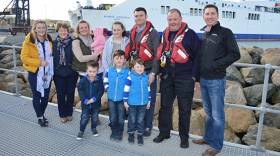Displaying items by tag: Tony Kehoe
A Fascinating Lifeboat Man
I said words in tribute to a Lifeboatman on radio this week that I have never said before as I introduced my programme (scroll down the page for the podcast). I meant them and I was honoured to be able to speak them about a man who has spent 42 years with the RNLI at what I regard as a famous lifeboat station. This is what I said on the programme:
“Thank you for joining me on this marine voyage in which we will hear a particularly interesting interview with a lifeboatman and the changes he has experienced in a 42-year career with the RNLI, Tony Kehoe of the famous Rosslare Lifeboat Station talks frankly about a life rescuing people in trouble at sea in a way in which I’ve never before heard a lifeboatman being so direct and clear about the good, the bad and the tough aspects of a career aboard lifeboats.”
Tony spoke of rescue work in older lifeboats and how they could be hard to handle! And about a time when “someone knocked on your door in the middle of the night and said you were needed at the lifeboat…” He talked of the changes, particularly in the speed of lifeboats getting to the scene of a rescue or tragedy faster and requiring quicker responses by the crew to a variety of issues arising from that speed over the water and also, what it does to the body physically, when hitting waves at speeds of 16 knots and more, rather than 8 knots in older boats.
He comes of a family with huge commitment to the lifeboat service and two of his sons also joined Rosslare Station. I was very impressed by his interview and particularly what he told Niamh Stephenson, also of the RNLI who did the interview for the programme, about the most important requirements for a good lifeboat crew ---- “being part of a team, trusting each other..” and his final wish for those who carry on the service: “Mind yourselves….”
I am confident that you will enjoy listening to his interview and will appreciate even more, the value of the lifeboat service when you have heard it.
In that regard I commend to you May Day, Sunday May 1, at the National Concert Hall in Dublin, where I intend to be, to hear the Wexford Sinfonia Orchestra play their five-part suite, ‘HEROES OF THE HELEN BLAKE,’ a tribute to the men of the Fethard-on-Sea Lifeboat who died in the rescue service to the sailing cargo ship, Mexico. The members of the orchestra range in age from 14 to 80. The performance will begin at 3 p.m. MAY DAY is the annual Fundraising Day for the lifeboats. Tickets are €20, students €15 and can be bought at the Box Office at the Concert Hall or online at www.nch.ie Do support the lifeboats on this day….
THIS ISLAND NATION reports on the maritime traditions, culture, history and modern marine developments in our island nation. Your comments are always welcome. Email: [email protected]




























































